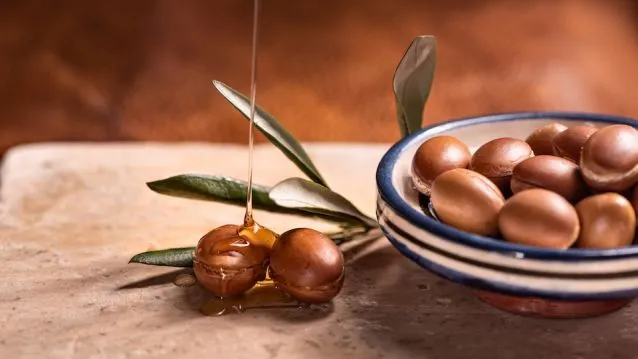If you have not heard of this valuable oil, it is time that was fixed. Argan oil is an edible oil that comes from the kernels of the Argania spinosa fruit. Argan trees are rare and only thrive in the desert-like conditions in Morocco where they live for up to 450 years. First used for culinary purposes, argan oil has a very nutty flavor and can be used in a number of dishes.
Besides being a flavorful addition to culinary creations, this liquid gold is highly valuable for skin, hair, and nails. Let’s take a look at just a few of the reasons why you may want to get your hands on some of this rich oil.
What makes argan oil so special?
Argan fruit kernels are roasted to extract their valuable oil. The oil is rich in soothing nutrients, including essential and healthy fats that our skin, hair, and nails crave. Most of the fat content of argan oil comes from oleic and linoleic acid (omega-6), which is an essential nutrient. Although oleic aid is not crucial, it is a valuable fat that makes up between 43-49% percent of healthy fat found in argan oil.
Argan oil is also a rich source of vitamin E, a potent antioxidant, which is necessary for healthy skin, hair, and nails. Additional antioxidant power found in argan oil comes from melatonin, plant sterols, and CoQ10
What is the difference between culinary argan oil and cosmetic argan oil?
Argan oil was originally used in Morocco as a culinary oil, and it is somewhat different from the cosmetic argan oil that most of us use. Although both are fantastic, the difference comes in the way that they are processed. To produce culinary oil, argan nuts are roasted first on an open fire and ground in a stone mill. The resulting oil has a rich nutty flavor and scent. The cosmetic oil is lighter and does not have as deep a nutty aroma. It is produced when nuts are pressed without being roasted first. This method is known as cold pressing.
Using argan oil for your skin
Argan oil contains antioxidants that tone, hydrate, and help to ease dry and cracked skin. If you enjoy making your own natural healing remedies, argan oil is a fantastic addition to healing salves and lotions that will soothe your skin. Here are just some of the ways that you can treat your skin with argan oil.
Wound healing – Argan oil helps to moisturize the skin and encourages a natural compound (allantoin) to penetrate the skin and accelerate healing. Studies show that it can help heal both skin ulcers and hypertrophic scars.
Sun damage protection – Moroccan women have used argan oil for centuries to protect their delicate skin from sun damage. One study found that the antioxidant activity in argan oil protected the skin against free radical damage that was caused by the sun. Burns and hyperpigmentation were both avoided when argan oil was used on the skin. In addition, long term use of the oil may help prevent the development of skin cancer such as melanoma.
Skin moisturizer – When you use argan oil for the first time, you will be amazed at just how quickly this rich oil absorbs into your skin. The tremendous moisturizing potential of argan oil is mostly thanks to the abundance of vitamin E contained within the oil. This fat-soluble antioxidant can also help to improve water retention in the skin.
Acne fixer – Although it may seem wrong to put oil on your skin when you are having an acne outbreak, argan oil is special. Most acne outbreaks are due to hormonal fluctuations and an excess of sebum. Luckily, argan oil has anti-sebum effects, which can regulate the amount of this compound on the skin. This calms the skin and promotes a consistently clearer complexion. For best results, apply argan oil directly to your skin twice a day.
Aids in healing skin infections – One of the most popular traditional uses of argan oil is to treat skin infections. Argan oil is loaded with antibacterial and fungicidal properties, which gives it the ability to remedy both bacterial and fungal skin infections. For aid in healing skin infections, apply argan oil to the impacted area twice a day.
Remedies and prevents stretch marks – Although stretch marks are common during pregnancy, anyone can experience them. In one study, it was found that a water-in-oil cream containing argan oil improved skin elasticity, which helped to prevent the development of stretch marks.
Decrease oiliness of skin – Some people have naturally oily skin. If you are one of these people, you may struggle to try to keep the oily sheen off our face. As mentioned above, argan oil has sebum-reducing capabilities, which means it can help reduce the oiliness of the skin. One study found that a twice a day application of a cream containing argan oil helped to reduce the oiliness of the skin in just four weeks.
Anti-aging impacts – Although argan oil has been used for some time as an anti-aging remedy, it was not supported by studies until recently. A study found that postmenopausal women who used a combination of oral and cosmetic argan oil had improved elasticity of the skin and noticed anti-aging benefits. To reap the benefits of this oil, apply directly to the skin and take an oral argan oil supplement as well.
* before using argan oil on your skin, test a small patch on your inner arm to be sure that you are not allergic
Using argan oil for your hair
Adding a little argan oil to your hair routine is a great way to not only nourish your hair but your scalp as well. Here are some great ways to infuse your hair with natural goodness.
- Conditioner – Because argan oil is so moisturizing, it makes an effective conditioner for dry and damaged hair. The molecules in argan oil are smaller than those found in other oils, which means that they can easily penetrate cuticles, leaving hair soft, shiny, and healthy. You will also notice fewer tangles and stronger hair over time. To use as a conditioner, work a a small amount of pure argan oil through your hair or opt for a hair mask that contains the oil. Apply to clean and damp hair and place a shower cap on your head for twenty minutes.
- Ease an itchy scalp – If you struggle with a dry, itchy scalp and even dandruff, argan oil might be just what you need. Many other oils clog pores, which can lead to damaged hair follicles. To use argan oil for your itchy scalp, massage a few drops into your scalp to help stimulate blood circulation. Leave the oil on your hair overnight and rinse in the morning.
- Reduce frizz – Use a few drops of argan oil on wet hair before styling. This will hydrate and prepare the hair for heat. Focus on the ends where frizz tends to be the worst. Also, using a little bit of argan oil on the ends of your air will help minimize the appearance of split ends.
- Boost shine – If your hair is looking rather lackluster, it may be time for a shot of argan oil. Unlike coconut and olive oil, argan oil is easily absorbed into hair strands and will not leave a greasy residue. Because argan oil is rich in fatty acids, it can help to bring that special shine back to your locks without weighing them down and causing a buildup. Apply a few drops to wet hair, focusing on the ends.
- Encourage hair growth – The phenols found in argan oil help to stimulate the scalp and promote hair growth. Massage a little oil into your scalp for several minutes daily to stimulate blood flow and open up pores.
Using argan oil for nails
Your nails will love the nourishing compound found in argan oil. I love to use a little argan oil in my nail care routine to help strengthen my nails, add moisture, and keep them looking healthy. Here are just some of the ways that argan oil can help you have super strong and beautiful nails, naturally.
- Strengthen nails – Mix equal parts of argan oil and lemon juice in a small dish. Soak your nails in the solution for 15 minutes. This treatment helps keep your nails from breaking and gives them a healthy and vibrant glow.
- Heal cuticles – If you have ever had dry and cracked cuticles, you know that it can be painful. Add a couple of drops of argan oil to your cuticles and massage them twice a day. In no time, your cracked cuticles will be a thing of the past.
- Fungal nail infection remedy – Before you opt for an over-the-counter nail fungus remedy, try argan oil. Apply two drops of oil to your infected nail three times a day until the infection subsides.
Choosing the best argan oil
When purchasing argan oil, search for 100 percent pure oil only. A high-quality oil will have a nice amber color and apply smoothly and easily absorb into the skin. It will have a slightly nutty scent that smells natural and pure.
-Susan Patterson


